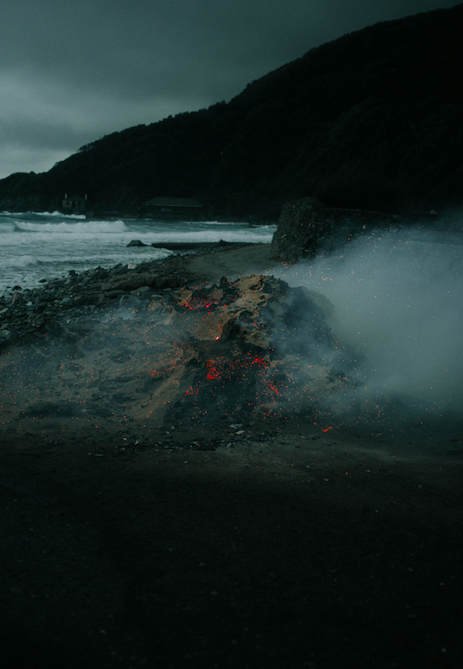I grew up knowing Lake Ontario brings the abundance of lake-effect snow to my hometown outside of Syracuse. When I was running on my high school track sometimes snow piles were still there in March while I was racing against time.
When my father was a teenager he lived with a foster family and went to high school near the southeastern shore of Lake Ontario. That’s where he joined the track team and choir, and through the seasons, became part of a family. There he began to live comfortably in his skin, his regrets were no bother, the place had changed him for the better. He was lifting off with so much of his future left.
My parents met at SUNY Oswego and in a photo they are sitting on a sandy beach on a grassy dune. My mother is in a polka dot bathing suit and my father in a white shirt is sleeping on her legs, deflated from an afternoon of revelry and sunshine. When I asked my mom in a text message where the photo was taken and if it was at a beach on Lake Ontario, she wrote back that it probably was. On that day they are youthful and with less responsibility, they are not parents, they might not be married, and they are not divorced, and among the natural beauty of the picturesque lake at sunset there were happier times and new beginnings.
Years later my father, 62 years old, moved into a small home in Phoenix, New York, and the slapping waves were again close, this time less than thirty minutes away. Perhaps he returned to the area because it held something of joy, of second chances and youth. It wasn’t perfect, but it was a comfortable enough home for him to restart after many years of instability and uncertainty and rehab. After recovering from his alcohol addiction, there were halfway houses and much tougher times. I imagine the tree lined road, maple leaves that fell before being buried in fresh snow, sunshine hitting icicles on the roof.
He spoke of the Three Rivers, the intersection of the Seneca and Oneida Rivers which form the Oswego River that flows into Lake Ontario. I never imagined the worst to come.
In February, the weather in the village of Phoenix can be brutal from being in the lake-effect snow belt. My father didn’t seem to mind. He left me voicemails that winter about getting new snow tires, shoveling, and how much he liked the peace and quiet in a winter wonderland. I could hear the smile in his voice.
“We’ve got ourselves another blizzard,” he said. I imagined his warm winter hat and wool coat and the sound of scraping ice off the windshield of his car.
My father hated the heat, anything above 80 degrees was hotter than hell and he was much happier with cooler weather. I hold up his navy jacket, and I imagine him wearing it. The jacket was hanging neatly on the coat hanger of the backseat door of his car after the fire. Looking at the jacket I know he did not want to die. He was ready for the next day and always the ready salesman. I imagine he felt his best wearing the jacket and the clean, straight lines of the collar and brass buttons was his ticket to a better chapter. If there had been a funeral with an open casket, would I have suggested that my father wear this navy sports jacket? If he had died another way, a gentler way, I might have, but he had been cremated before I arrived at his car.
The fire report explains ice hit the gas line which caused the explosion and fire. I was told it happened fast, and my father did not feel any pain. The fire hoses couldn’t make it through the unplowed long driveway, but he was gone before the sirens went down the country road.
What do you do with all the words left unsaid? Do you send your heavy grief into the wind? Where do you send your wishes to rewind time? Over 11 winters have passed without a word. Making peace with sudden death is not realistic, when life is snatched from you, without warning, without a goodbye, when a timeline crumbles to ash.
I want to believe the morning of the fire my father’s soul rose above the smoke and away from the burnt wood beams and metal, and he felt no pain. In my mind the gray and smut met the clear blue sky at dawn. I want to believe what was left of him somehow met a strong wind and easily he blended into his new fleet, swooping with the invisible pulse of the Oswego River, over the red maples, and down the dunes to the shore of Lake Ontario before becoming one with the air.
Isobella Jade H
Isobella Jade is an author and essayist born and raised in Central New York. She writes
often about parenting, grief and nature and her work has appeared inThe New York
Times,Business Insider,SheKnows,Glamour,SELF,Canary, and elsewhere. She is
the author ofRunning Rebel and Mad Dog, a memoir of heirlooms left behind. Jade
currently lives in Houston with her two kids.
